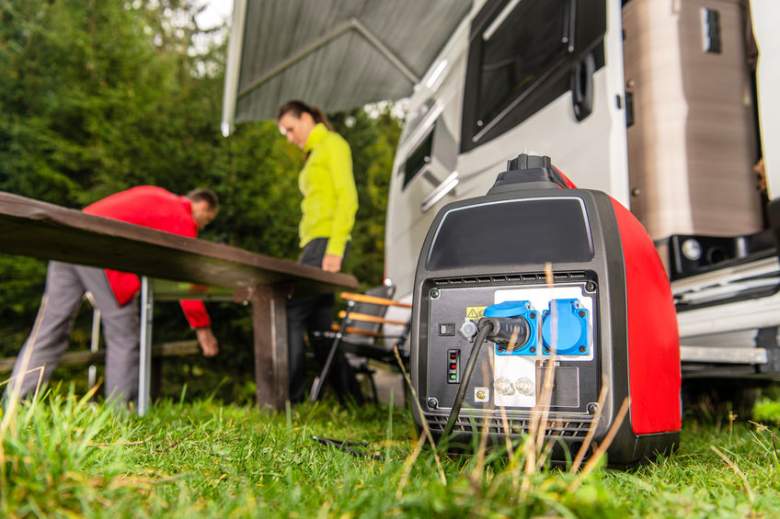
123rf.com (welcomia)
There are many reasons why having a portable generator on hand is a really good idea. But if you’re like many people who may not live in areas plagued by hurricanes or tornadoes and don’t have the space for a portable generator, a small generator might fit your lifestyle a little better.
Small generators are great for camping and travel, too. Most of the units on our list are inverter generators meaning they can be connected in parallel for RV use or split up to provide portable power where it’s needed. You will love your new small generator and will get a ton of use out of it as soon as you take it out of the box. Never go without power again.
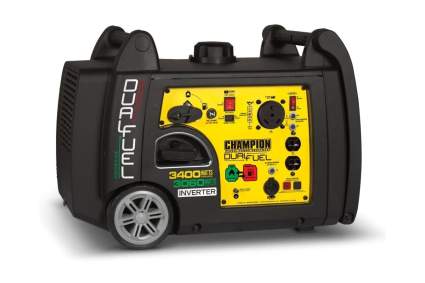
|
Amazon Customer Reviews
|
Price: $1,049.00 Shop at Amazon | Shop now Read our review |
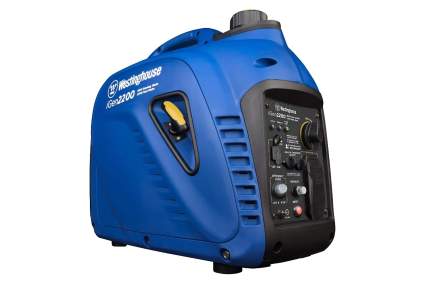
|
Amazon Customer Reviews
|
Price: $478.46 Shop at Amazon | Shop now Read our review |
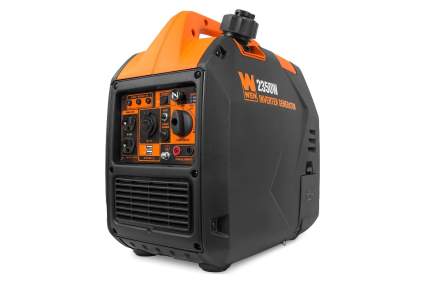
|
Amazon Customer Reviews
|
Price: $429.00 Shop at Amazon | Shop now Read our review |
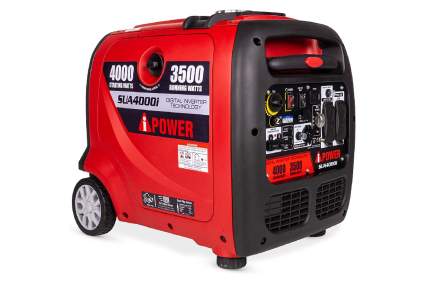
|
Amazon Customer Reviews
|
Price: $1,123.62 Shop at Amazon | Shop now Read our review |
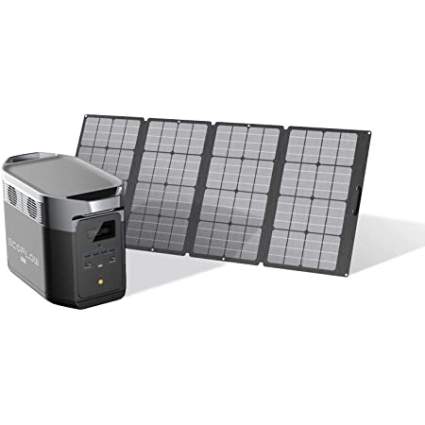
|
Amazon Customer Reviews
|
Price: $1,249.00 Shop at Amazon | Shop now Read our review |
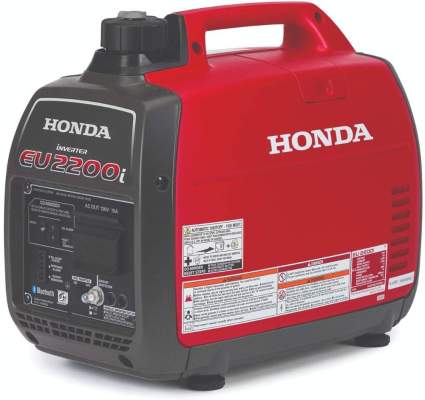
|
Amazon Customer Reviews
|
Price: $1,095.00 Shop at Amazon | Shop now Read our review |
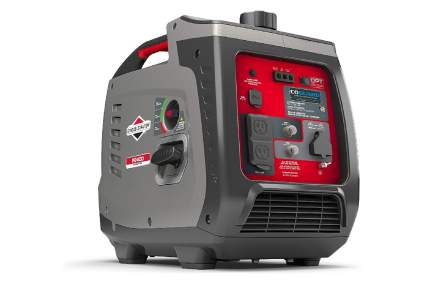
|
Amazon Customer Reviews
|
Price: $799.00 Shop at Amazon | Shop now Read our review |
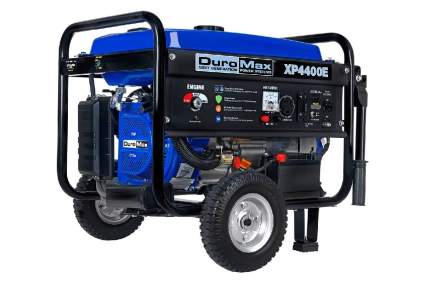
|
Amazon Customer Reviews
|
Price: $595.00 Shop at Amazon | Shop now Read our review |
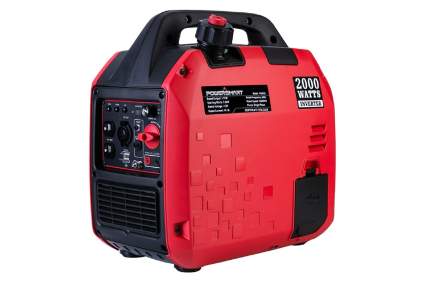
|
Amazon Customer Reviews
|
Price: $339.00 Shop at Amazon | Shop now Read our review |
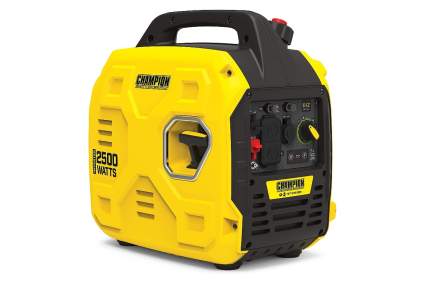
|
Amazon Customer Reviews
|
Price: $619.99 Shop at Amazon | Shop now Read our review |
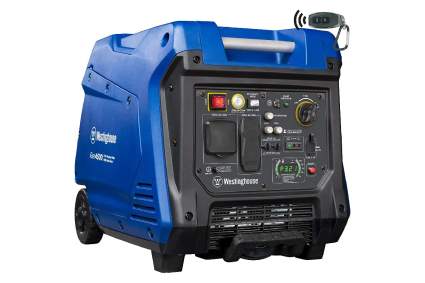
|
Amazon Customer Reviews
|
Price: $849.00 Shop at Amazon | Shop now Read our review |
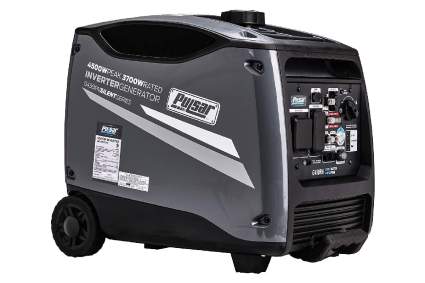
|
Amazon Customer Reviews
|
Price: $749.99 Shop at Amazon | Shop now Read our review |
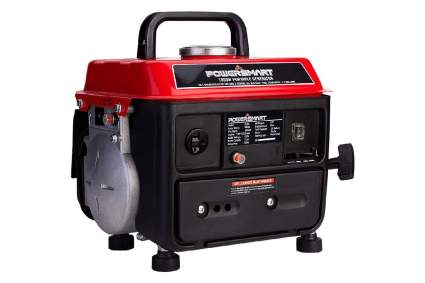
|
Amazon Customer Reviews
|
Price: $159.00 Shop at Amazon | Shop now Read our review |
-
1. EDITOR’S CHOICE: Champion 3400-Watt Portable Generator
Pros:- Dual fuel capability
- Half the price of major name-brands
- Runs super quiet
Cons:- Expensive for 3,400 Watts
- Propane power may struggle to start up machines needing high peak wattage
- 110 pounds is heavy for a small generator
The Champion 3400 Watt small generator is more expensive than the others on our list and for very good reason. For one, it may be powered by either propane or gasoline. No adjustments are necessary to take advantage of the propane-fueled feature; it’s ready to work with standard propane bottles right out of the box.
For another reason, it’s an inverter generator so runs quieter and more efficiently than standard generators. Whether you are out in the RV, tailgating, or working in the field, the Champion 3400 maxes out at 59 dBA for noise. It’s RV-ready with one 120V 30A circuit as well as two 120V 20A household outlets with a 12V DC outlet and dual USB adapter.
The mobility kit is built into the housing for easy maneuvering and it also features an electric start making for an ultra-simple operation. There’s also a recoil pull start if you’re so inclined. And with the Para LInk parallel kit, you can sync two of these units up for double the electric power.
Find more Champion 3400-Watt Dual Fuel Inverter Generator information and reviews here.
-
2. RUNNER UP: Westinghouse iGen2200 Portable Generator
Pros:- Full slate of indicator lights
- Simple, compact footprint
- Weighs just 46 pounds
Cons:- No electric start
- No DC output
- No 30A circuit for an RV
Westinghouse iGen2200 Inverter Generator is rated at 1,800 running Watts and 2,200 starting weighing just 46 pounds. For a gas-powered generator, that’s about as light as it gets. I’m a big fan of Westinghouse generators and own a much larger one to power my house in case things go south in a hurry. It starts quickly, runs lean, and is fuel-efficient.
This inverter generator runs quiet and is a great choice for an emergency power backup in case of a power outage as well as to provide electricity to gear while you’re on the road. The iGen2200 runs as low as 52 dBA for noise output and can run 12 hours on 1.2 gallons of gasoline with its Economy Mode setting (roughly a 25% load).
This mini generator offers two 120V 20A outlets as well as two USB outlets for charging devices. It’s also parallel capable and can work in tandem with many other Westinghouse generators including the Westinghouse WH2200iXLT, iGen1200, iGen2200, and iGen2500 to increase your available Wattage. You’ll need the Westinghouse parallel cord, though, and that’s sold separately. If you need a DC outlet on your small generator, consider the iGen2600.
Find more Westinghouse iGen2200 Inverter Generator information and reviews here.
-
3. WEN 56235i Super Quiet 2350-Watt Portable Inverter Generator
Pros:- Runs 10-1/2 hours on a quarter load
- 39 pounds is a lot easier to carry
- Works smarter, not harder
Cons:- No bells and whistles like a Watt meter or gas gauge
- Requires more maintenance for longevity
- Requires an external ground when used (sold separately)
The WEN 56235i Portable Inverter Generator provides 2,350 peak Watts and runs at about the noise of a normal conversation during average use. It has an eco-mode feature that allows the motor to adjust the amount of fuel it takes in based on its needs, saving fuel and saving you some hard-earned cash. Plus, its ultra-small form factor only weighs 39 pounds, making it incredibly easy to haul around.
The control panel features two 120V 15A household outlets, 1A and 2.1A USB ports, and a 12V DC outlet. Indicator lights will let you know about the status of low oil, overload, or output. The WEN 56235i has a one-gallon tank on board which is good enough to run for about 10-1/2 hours at 25% of the load. Not too shabby.
One nice feature that WEN calls out is their fuel shutoff switch. This prevents blockage and limits maintenance by using up the remaining fuel from the carburetor before the engine shuts down. That’s a nice touch and one I haven’t seen talked about with other mini generators.
Find more WEN 56235i 2350 Watt Portable Inverter Generator information and reviews here.
-
4. A-iPower SUA4000i 4000 Watt Portable Inverter Generator
Pros:- Features a 120V 30A RV outlet as well as a household 20A
- Nice power to efficiency ratio
- Mobility kit is built in
Cons:- Heavy
- Be sure to check for damage before accepting shipment
- It's a bit loud
I’m featuring the 4,000-Watt version of the A-iPower Inverter Generator here but They have two smaller versions that provide 1,500 and 2,000 Watts in case you want something smaller. 4,000 Watts is sort of top of the scale for small generators but this one is inexpensive enough that I listed it here anyway. The built-in mobility kit, the small form factor, and the power to efficiency ratio are fairly impressive.
A-iPower features “low idle” technology in their generators which, in the case of this SUA4000i, will provide a five-hour runtime at 100% load and seven hours at a 50% load. The engine is a 223cc OHV 4-stroke gas-powered model with a pull-start. The control panel features two 120V outlets, one 20A and one 30A, along with two USB ports, and a 12V DC port. The SUA4000i also features an hour meter for help with planning your next fuel fill.
Find more A-iPower SUA4000i 4000 Watt Inverter Generator information and reviews here.
-
5. EF ECOFLOW Delta Max (2000) Solar Generator
Pros:- Solar panels
- Use less fuel
- Portable
Cons:- Price point
- Only two options
- One color choice
For the solar-powered enthusiasts out there we have selected a fantastic portable generator that will definitely get you the most bang for your buck, allow me to introduce you to the EF ECOFLOW Delta Max. Both the generator and the solar panels that charge it are portable so you can store them in your vehicle, shed, garage, RV, or basically anywhere else that you need to save a little space but add a little more power.
Harnessing the power of the sun may make you feel like you belong in the Marvel Cinematic Universe, but in reality, you are just saving money on fuel and on electricity. You can use this generator on everything from a grill, to a hot tub, to pumping the water out of a pool to nice steam in your outdoor sauna. The possibilities are endless!
Find more EF ECOFLOW Delta Max (2000) Solar Generator information and reviews here.
-
6. Honda EU2200i 2200-Watt 120-Volt Portable Generator
Pros:- Trusted brand name
- Durable
- Easy to operate
Cons:- 120 Watt max
- Somewhat cumbersome
- One color choice
Looking for a smaller portable generator that has a trusted name and tons of power? Then you have come to the right place. This Honda portable generator can go everywhere that you go. It features 120 watts of power, and although that may not seem like a lot, it can give you the power to anything you need. Have a small grill that you use while boating? This generator is the right pick. Maybe you are looking to power a projector for a backyard movie night? You really cannot go wrong with a Honda-made generator because Honda has been making trusty generators for a long long time.
Find more Honda EU2200i 2200-Watt 120-Volt Portable Generator information and reviews here.
-
7. Briggs & Stratton P2400 PowerSmart Inverter Generator
Pros:- 12-plus hours of use on one gallon of gas with a light load
- Fairly quiet operation
- Nice H-style handles for carrying options
Cons:- Name brand adds to the price tag
- Not carb-compliant for California
- Maxes out at 3,000 combined watts in parallel no matter what generator is used
The Briggs & Stratton P2400 PowerSmart Series inverter generator provides emergency power when you need it most. It’s also good for fun power when you go camping or head up to a lake cabin. The control panel is much like the other small generators on our list but I like the graphic icons that accompany the indicator lights a lot more here. Two 5V USB ports are offered here as well as two 120V 20V outlets; the control panel labeling states 125V but the official documentation confirms 120V. Weird.
The compact design is fairly lightweight and runs quiet enough however it’s about the level of a running car. I like the H-style handle very much for transport and wish other generators would adopt this design. This generator will make a great gift to any dad that needs a little more juice in his tool collection.
Find more Briggs & Stratton P2400 PowerSmart Inverter Generator information and reviews here.
-
8. DuroMax XP4400E 7HP RV Grade Gas Generator
Pros:- 120/240V 30A twist lock outlet
- 3.96-gallon gas tank
- Onboard volt meter
Cons:- Noisy
- 100 pounds
- Requires oil changes every 20 hours
For a few more bucks, do yourself a favor and upgrade your DuroMax small generator from the XP4000s to the XP4400E. The XP4400E comes with a wheel kit and 400 more Watts to invite to the party for just over $10. For anyone that travels extensively with an RV, the DuroMax XP4400E is very handy to have on hand.
It’s definitely larger (and heavier) than 2,000 Watt generators however the included mobility kit makes this a little easier to swallow. What also takes the sting away is the twist lock 120/240V 30A outlet, perfect for tying right into that recreational vehicle. The added voltmeter is a nice touch as well.
What you’ll have to plan on is noise, however. The motor puts off 7HP with a large gas tank to boot in order to provide 4,400 peaks, Watts. The documentation states 69dB which really isn’t all that loud but many online reviews have complained that the noise they’ve experienced is significantly louder. Still, this small (ish) generator can power your entire camping setup and then some.
Find more DuroMax XP4400E 7HP RV Grade Gas Generator information and reviews here.
-
9. PowerSmart PS5020 2000-Watt Inverter Generator
Pros:- Compact footprint
- Quiet operation
- Attractive, lightweight design
Cons:- No 30A outlet available
- Control panel features small labels that are a little hard to read
- Running wattage is a little low for anything other than small appliances
PowerSmart is a relatively new player in the yard power tool scene and the PowerSmart PS5020 2000-Watt Inverter Generator is their entry into the portable power game. The chunky handle for easy transport is a nice touch as is the off to the side and angled gas fill spout. The compact footprint will leave you with nothing to complain about in terms of storage or attractiveness.
But how does it run? PowerSmart claims that their PS5020 is “super quiet” and they’re somewhat correct. Running noise won’t be louder than a conversation while powering half of the maximum Wattage capability. The engine is a one-gallon gasoline-powered model with 79cc.
Like most all small generators, the control panel features two household 120V outlets, two USB ports, and a 12V DC outlet. A large power control knob can’t be missed, either. The rest of the amenities are straightforward: indicator lights, parallel connection ports, choke, and the like. The PS5020 is a great little generator in a tightly-designed package.
Find more PowerSmart PS5020 2000-Watt Inverter Generator information and reviews here.
-
10. Champion Power Equipment 2500-Watt Portable Inverter Generator
Pros:- Provides clean electricity for sensitive electronics
- Lightweight and ultra-portable
- Nice safety yellow color
Cons:- Manage your noise level expectations
- You'll have to fill with oil when you get it but at least it won't spill
- Documentation detailing operation could be better
I gotta admit: I like the eye-watering yellow color of the Champion Power Equipment 2500-Watt Inverter Generator. You’re not going to have to work hard to find it in the garage and only the most unobservant of people will trip over it in the wild. Generators are sensitive pieces of hardware and are somewhat dangerous and it’s good that an easy safety feature like color is used so prominently here.
This small generator only weighs 39 pounds, one of the lightest 2500-watt inverters available on the market. Champion claims that the noise level is a slight 53 dB from 23 feet away, making it good for camping, tailgating, or backup essential home appliances. Your mileage may vary depending on the electrical load you require.
With 1,850 running watts available, this little generator can run for 11-1/2 hours when managed effectively. With an optional clip-on parallel kit (sold separately), this inverter can connect with another 2500-watt Champion inverter to double the power throughput for RVs or large appliances. They stack as well which is a nice clean touch.
Find more Champion Power Equipment 2500-Watt Inverter Generator information and reviews here.
-
11. Westinghouse iGen4500 Portable Inverter Generator
Pros:- Great digital gauge with valuable data
- 120V 30A twist lock outlet for RV use
- Remote start feature
Cons:- Heavy
- Carry handle is somewhat inconvenient to get to
- No 12V DC option
I said in an earlier review what a fan I was of Westinghouse’s line of electric generators and I’ll say it again with this review of the Westinghouse iGen4500 Portable Inverter Generator. Most inverters can run in parallel to provide power for large appliances or an RV. That’s cool but to do so requires the purchase of two machines. So for the money, you might as well consider this model.
This small generator has a really great control panel. Not only does it provide a 120V 30A twist lock outlet that’s ready to go for your RV needs, but it also provides a digital gauge with remaining runtime, power output in kilowatts, fuel level, and voltage. The control panel also features a parallel hookup as well so if you really wanted to play with some power, you could hook up another small inverter if you had one.
The iGen4500 also has a remote start feature as well as a push-button electric start on the housing. The tank is a stout four gallons that will provide a long running time. Although the machine is heavy, weighing 93 pounds, the included wheel kit will assist you with moving this generator around.
Find more Westinghouse iGen4500 Portable Inverter Generator information and reviews here.
-
12. Pulsar G450RN 4500 Watt Inverter Generator
Pros:- RV-ready twist lock outlet
- Simple, compact, and efficient
- Great value for the price
Cons:- The color and shape is somewhat boring
- No data gauges
- Wheels are really small
I’m not a huge fan of the color scheme of the Pulsar G450RN 4500 Watt Inverter Generator but you can’t argue with its price or capabilities. This small generator offers 4,500 peak and 3,700 running Watts for much less than most of the generators I’ve looked at. Both the G450RN and the Westinghouse iGen4500 are really good options if you run around the country in a large camper or RV.
This Pulsar G450RN is capable of up to 15 hours of extended operation on a half load with 3.2 gallons of fuel. This unit also features an electric start with a remote option that works from up to 80 feet away. Pulsar claims that it’s “virtually silent” from 10 feet away but with 3,700 Watts being produced, there isn’t a motor on the planet that’s truly “quiet”, much less “silent”. Still, it’s not bad.
The compact design and color scheme of this small generator makes me think of an ice resurfacer at any hockey rink in the country. The little wheels are fine for transporting small distances but I wouldn’t want to pull over rough terrain. The extendable handle is welcome even though it’s tough to get to. There aren’t any fancy gauges here like there are on the Westinghouse iGen4500 but maybe the reduction in price will make up for that.
Find more Pulsar G450RN 4500 Watt Inverter Generator information and reviews here.
-
13. PowerSmart PS50A 1000-Watt Gas Generator
Pros:- Can run for five hours with a half load
- Bare bones simplicity
- Completely portable
Cons:- Just one electrical outlet
- Mixed fuel...but no oil changes
- Low Watts
If you don’t mind roughing it and you don’t mind mixing fuel and you only need a small generator for up to 900 running Watts, allow me to introduce you to the PowerSmart PS50A 1000-Watt Gas Generator. It packs a big punch and stays right around that $200 mark.
First things first: this little guy requires mixed fuel like a chainsaw because it employs a 2-stroke gas engine to do its magic. You might think that’s a deal-breaker but think about this: it doesn’t require frequent oil changes or any oil, for that matter. Not a bad trade-off.
It’s light, it’s extremely portable, and did I mention that it’s cheap? If all you need is a mini generator to power an item here or there, then the PowerSmart PS50A is it, my friend. But beware: it’s loud.
Find more PowerSmart PS50A 1000-Watt Gas Generator information and reviews here.
Why Should I Buy a Small Generator?
The simple answer is that small generators offer up a little insurance for your power needs in the event of a power loss due to a weather emergency, overloaded power grid, or maybe even construction in your neighborhood. These generators offer approximately 2,000 Watts for appliance and equipment needs that we'll go over below.
Mini generators are useful tools to have on hand for remote project needs as well. They can handle the electrical load necessary to run most power tools. If you're working on a building project somewhere that isn't hooked up to a permanent meter yet, a small generator is a real lifesaver.
If you're like so many people these days, you're working from home. Power for your computer and internet connection may be paramount even during a blackout. A small generator could handle your needs during the workday and then be used for other household needs later on.
But small generators aren't just for necessary applications in emergency and work situations. They're also really great for having fun, too. Whether you'd like to watch a movie in the backyard, need some electrical power while tailgating, or maybe at the beach, mini generators are small, lightweight, and much quieter than their larger cousins.
Small generators are also, well, small. They're much easier to store than larger portable generators meant to power an entire house. And while mini generators don't have the ability to power an entire house, they can definitely handle an appliance or two not to mention charge up portable devices.
What Will a Small Generator Power?
You may be surprised at the variety of appliances, power tools, and toys that a mini generator can keep going. Keep in mind that most machines that need electricity will require much more of it to start than they will while running. The small generator you choose will need to be powerful enough to compensate for that starting electricity draw.
Many small generators can support multiple devices during operation. Once an appliance that needs a lot of juice to get started is running, the amount of power it then requires will be reduced enough to power other things. An air compressor can be a real power hog to start but then once it's started, another power tool or device can draw off the generator's supply.
The first thing most people think about needing power for during an emergency is the all-important refrigerator. Common mid-sized refrigerators that are Energy Star rated use around 1,200 Watts when the compressor starts before coming down to a much more reasonable 200 running watts.
In the event of a power emergency, folks that use a sump pump to keep water out of a well pump to bring water in can be in a tight spot. Sump pumps, like refrigerators, typically draw 1,200 Watts to start as well as 800 while running. But when it's up and running, a mini generator could handle the well pump also.
Other appliances that could be powered by a mini generator include a chest freezer, microwave oven, or electric grills and stoves. If you're on a camping trip and roughing it in an RV or cabin, a small generator could be used for a variety of items one at a time.
Finally, it's important to understand what small generators aren't good for. Larger household staples like washers and dryers use a lot of electricity. A generator with a ceiling of 2,000 Watts might be able to provide power for a washer but you'll be out of luck if you need a clothes dryer. Also, know that your washer will need the entire generator for itself with nothing else being powered.
Air conditioners may very well need more than 2,000 Watts to start. If you live in an area where air conditioning is a must-have amenity, you may need to look for a generator that can handle the load. Like other appliances, the power need is reduced by a lot once an air conditioner is running, typically around 1,500 Watts of continuous power.
What Size Generator Should I Buy?
It really depends on what your needs are. If the power doesn't go out very often in your neighborhood, and you can make do for a day or two when it does, a small generator that tops out at 2,000 Watts is great to keep your refrigerator going.
Small generators are great for occasions like supplying electricity for a computer and projector for drive-in movie night in the backyard. Bring a small portable generator to a family reunion or to the beach and you might very well end up a hero for supplying power for the cookout.
Some of the small portable generators on our list are inverter generators. Inverters are called this because they use an inverter alternator that produces three-phase AC power that is converted to DC and then back again (inverted) to AC power. This power is safer for electronics like computers or mobile devices.
Inverters are typically appliances than conventional generators although both units use gasoline engines to operate. Inverter generators are also mostly more expensive than your standard generators, too. Inverters have a unique ability, however: they can pair together to provide double the electricity, with the right cords and equipment.